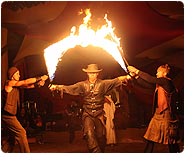|
|
 |
 Indulging in the Moment: The Beloved Festival Turns Oregon’s Most Gorgeous Valley into an Experience to be Savored, August 9-13, 2012
Indulging in the Moment: The Beloved Festival Turns Oregon’s Most Gorgeous Valley into an Experience to be Savored, August 9-13, 2012
The sun rose and the ragas began. After dancing all night to edgy cascades of electronica, a few happy souls sat at daybreak on the edge of Oregon’s Coastal Range. A classical Indian singer’s pure voice rang out.
“I was looking out at this beautiful fog that rolls in around sunrise at that time of year. The fog was lifting, and the sun was showing through,” recalls Elliot Rasenick, founder and organizer of the Beloved Sacred Art & Music Festival (August 9-13, 2012; www.belovedfestival.com). “We were watching people melt at that rare and precious moment.”
In the one month a year when the rains cease, at the unexpected intersection of underground dancefloors and spiritual exploration, Beloved brings together the gutsy, the sensual, and the glorious for a weekend of relaxation, celebration, and vibrant community. For Beloved’s organizers, it’s all one: A cutting-edge bass music producer, a cathartic gospel number, a great yoga class, a free-spirited group improvisation, a delicious meal can all point the way to the spirit.
This year’s musical offerings include the stirring Garifuna songs of Aurelio Martinez, a critics’ favorite who channels the powerful mix of indigenous, African, and European traditions his shipwrecked former slave ancestors created in Central America. Dancefloor shamans Lulacruza turn organic sounds from their Latin heritage and their worldly training at Berklee into spirit-filled songs and evocative soundscapes.
But Beloved pushes beyond mere listening. Festival darling Matt Butler, the force behind Everyone Orchestra, uses the drama and rigor of conducting to harness the intensity of the cream of the jam, rock, and world pop scenes—and to bring the audience fully into the show as music makers. David Stringer has won an international following for his compelling leadership of kirtan chanting sessions, where Stringer uses ancient roots, call and response, and Sanskrit sounds to draw participants into states of reflection and bliss.
Along with participatory performances, the Festival’s extensive educational programming offers fans a chance to explore a wide range of approaches to spiritual practice and self-care. Mythic storytelling and healing rituals, yoga sessions and massage workshops—along with jubilant participatory musical performances and all-night dancing—turn the Festival from mere event to true experience. It’s a spa-meets-sounds party in the country’s most gorgeous coastal woods.
Along with prominent artists and engaging teachers, festival goers might catch a champion throatsinger, African hand drummer, and an ecstatic crowd making spontaneous music together offstage. Or they might see Gnawan performer Hassan Hakmoun wrapped in Peruvian wool against the pleasant Oregon chill, or underground DJs entranced by Sufi devotional music.
This makes perfect sense to Rasenick: “We like to play with cultural collision and make it fun.”
The Portland-based promoter got the idea for Beloved when he realized the audiences at the electronica events and kirtans (yoga-related chanting sessions popular in India) he organized had a great deal in common. “There were these two different audiences, doing same thing and wanting the same thing,” explains Rasenick. “The two communities had a lot to learn from one another, but never got together.“
Rasenick resolved to remedy that, and launched an open-air festival. Unlike many festivals, Beloved has only one stage, increasing the focus and encouraging people of different tastes, backgrounds, and faiths to listen intently to one another.
“Most music festivals keep you flitting from place to place, which can be pleasant,” Rasenick notes. “We want to help participants learn to fully engage every single moment.”
The single-stage focus leads to deep dialogue between festival fans and musicians, between people from radically divergent backgrounds, between the natural and sonic environment. The festival site, a valley two hours from Portland, is a headliner in and of itself: Though usually rain soaked most of the year, in August the valley near Tidewater, Oregon is remarkably clear. The site demands respect, and the festival strives to minimize its ecological impact, from offering free (non-bottled) water to selecting food and art vendors based on their green commitment.
In the lush wooded setting, people begin to open up, embracing new music and new spiritual ideas. Rasenick hears regularly from overjoyed performers and from festival goers who have found new insights, be they dance music fans who learned to love 1000-year-old sounds or skeptics who found spiritual healing in the ecumenical atmosphere of the festival.
“At that time, in that place, it’s the most beautiful moment of one of the most beautiful places on planet,” muses Rasenick. “It lets us create own little universe.”
|
|
 |
|
|
|